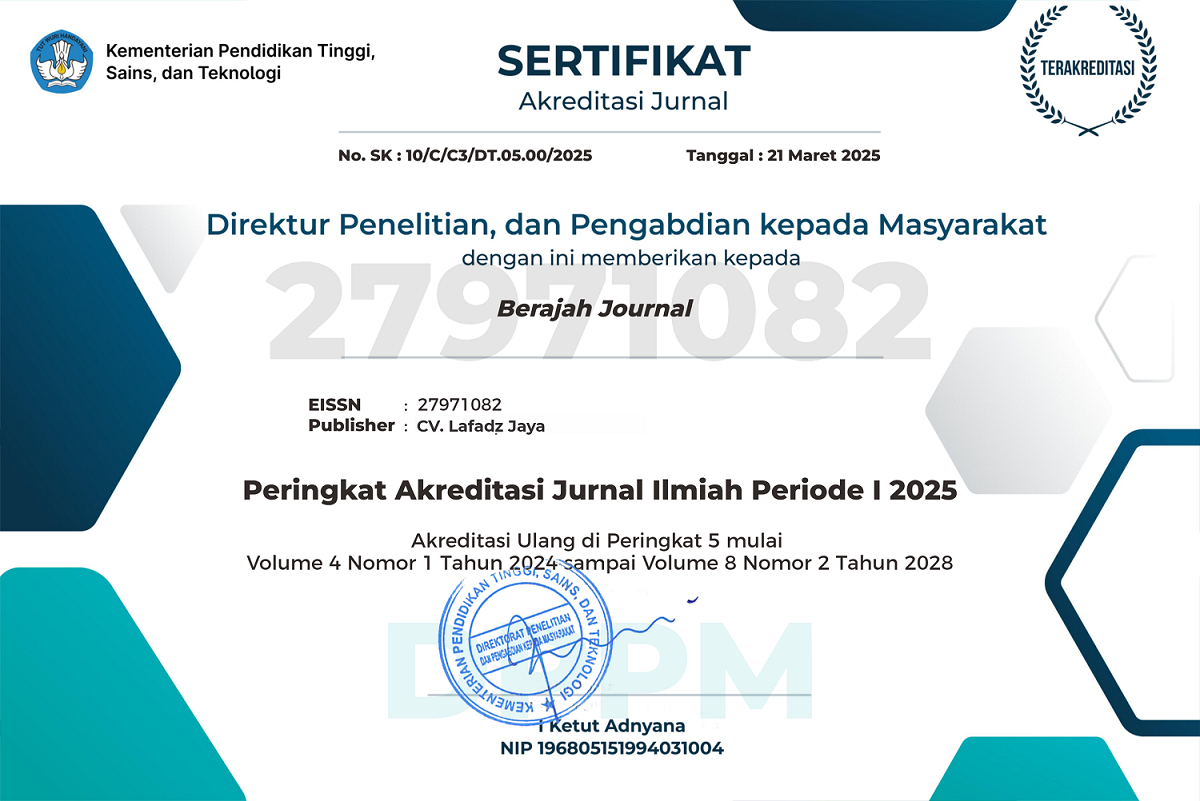PASCAKEBENARAN (POST-TRUTH) DALAM KEHIDUPAN SOSIAL
DOI:
https://doi.org/10.47353/bj.v4i3.360Keywords:
Post-truth, Social life, EducationAbstract
This research aims to analyze post-truth phenomena and their impact in the context of social life. Post-truth, which is an era where lies can be disguised as truth, has changed the information landscape and public perception. This article explores the concept of post-truth from a philosophical and contextual perspective. Additionally, its impact on social polarization and public opinion is also explored. The polarization of society is increasing because post-truth strengthens divisions between groups with different views. This influences public opinion, where emotions and personal beliefs often take precedence over facts. This article also discusses educational and public policy strategies that can be used to address the negative impacts of post-truth. Increasing media literacy, information transparency, moral education, and cooperation between government, media, and educational institutions are the keys to facing this challenge. Thus, this article provides an in-depth understanding of the post-truth phenomenon and attempts to overcome its impact in social life.
Downloads
References
Abadi, Mansurni, Cenruang Alung, Iman Permadi, and Yana Schova. “STRATEGI MITIGASI DAMPAK NEGATIF POLITIK IDENTITAS SEBELUM DAN SESUDAH PEMILU.” Electoral Governance: Jurnal Tata Kelola Pemilu Indonesia 4, no. 2 (May 2023): 142–65. www.journal.kpu.go.id.
Adzfar, Zainul, and Badrul Munir Chair. “Kebenaran Di Era Post-Truth Dan Dampaknya Bagi Keilmuan Akidah.” Fikrah: Jurnal Ilmu Aqidah Dan Studi Keagamaan 9, no. 2 (2021): 165–82. https://doi.org/10.21043/fikrah.v8i1.12596.
Ar Razy, Mohammad Refi Omar, and Mumuh Muhsin Zakaria. “Truth & Post Truth Dewasa Ini.” SOSFILKOM 15, no. 02 (2021): 19–35.
Juleha, Juleha, Jusfira Yuniar, and Nur Riswandi Marsuki. “Peran Media Sosial Dalam Dinamika Opini Publik Dan Partisipasi Politik Era Digital.” Concept: Journal of Social Humanities and Education 3, no. 1 (March 2024): 38–45. https://doi.org/10.55606/concept.v3i1.951.
Kelkar, Shreeharsh. “Post-Truth and the Search for Objectivity: Political Polarization and the Remaking of Knowledge Production.” Engaging Science, Technology, and Society 5 (April 3, 2019): 86–106. https://doi.org/10.17351/ests2019.268.
Malcolm, Dominic. “Post-Truth Society? An Eliasian Sociological Analysis of Knowledge in the 21st Century.” Sociology 55, no. 6 (December 1, 2021): 1063–79. https://doi.org/10.1177/0038038521994039.
Maskuri. “KEBIJAKAN PENDIDIKAN SEBAGAI KEBIJAKAN PUBLIK DALAM SISTEM POLITIK DI INDONESIA.” JPII 2, no. 1 (October 2017): 78–91.
Pratama, Herdito Sandi. “Urgensi Kebajikan Intelektual Di Era Pascakebenaran: Suatu Deskripsi Analitis Melalui Pemikiran Epistemologi Kebajikan Linda Zagzebski.” RESPONS 23, no. 2 (2018): 167–84.
Qadri, Muhammad. “PENGARUH MEDIA SOSIAL DALAM MEMBANGUN OPINI PUBLIK.” Qaumiyyah: Jurnal Hukum Tata Negara, n.d.
Tanjung, Alber, Salma Yetti, Aldri Frinaldi, and Syamsir Syamsir. “Implementasi Kebijakan Pendidikan Terhadap Kebijakan Publik.” JIM: Jurnal Ilmiah Mahasiswa Pendidikan Sejarah 8, no. 2 (April 29, 2023): 545–51. https://doi.org/10.24815/jimps.v8i2.24712.
Taufik, Cevi Mochamad, and Nana Suryana. Media, Kebenaran, Dan Post-Truth. Edited by Ling Saefudin. Bandung: Widina Bhakti Persada Bandung, 2022.
Mahmudah, Rifa Zakiah, and Mulyawan Safwandi Nugraha. “Manajemen Sumber Daya Manusia Dalam Persfektif Hadits.” Jurnal Mahasiswa Kreatif 1, no. 4 (July 2023): 148–61. https://doi.org/10.59581/jmk-widyakarya.v1i3.737.
Downloads
Published
How to Cite
Issue
Section
License
Copyright (c) 2024 Marhan Pebrianto, Yatin Mulyono

This work is licensed under a Creative Commons Attribution 4.0 International License.






















